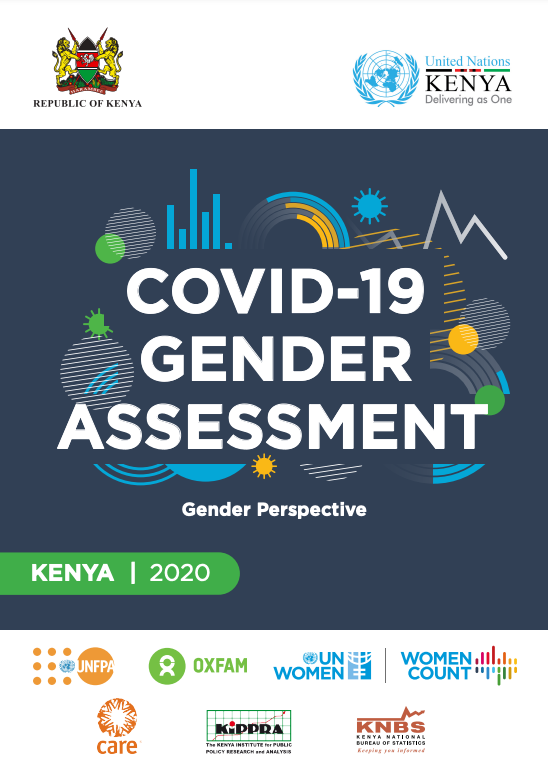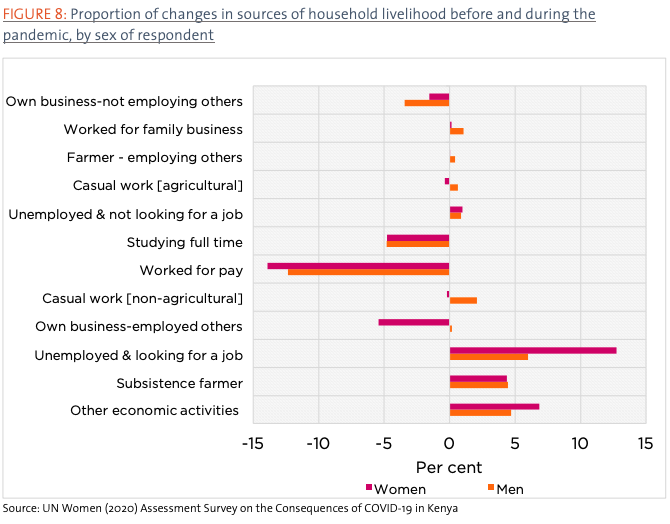Case Study: How COVID-19 is Impacting Women and Men Across Kenya
UN Women partners with GeoPoll and others to measure the disparate impacts of COVID-19 on women

Background
UN Women is the United Nations agency dedicated to developing and upholding standards for gender equality around the world. Some of their priorities include ensuring women benefit equally from governance systems, providing women with income security and economic autonomy, ensuring all women live free from violence, and providing women and girls with greater influence in the building of sustainable peace and resilience programs. When a humanitarian disaster arises, UN Women works to understand how women specifically may be impacted in order to design programs that better support women and the challenges they may be facing during crises.
The COVID-19 pandemic has had profound economic and social effects on populations around the globe, ranging from job loss to mental health impacts. While these effects are felt by many, women have often experienced outsized impacts of the pandemic on jobs and income, gender-based violence, and education. Because of the increased focus on home life during COVID-19, women around the world have taken on an additional burden in unpaid domestic work and childcare needs, which may result in women needing to stop their own work in order to care for others. There have been reports of gender-based violence increasing during the pandemic due to increased levels of stress and hardships, combined with the inability for women to leave their home freely due to restrictions on movements. Additionally, due to the closure of schools, girls in many regions may be at increased risk of gender-based violence and early pregnancies, and are less likely to have access to sufficient education and facilities related to menstrual hygiene.
With this background, UN Women along with the Kenyan government and other partners including Oxfam, Unilever, and UNFPA sought to conduct a comprehensive gender assessment of the effects of COVID-19 and how they differed between women and men. The aim of this study was to analyze the gendered socio-economic effects of COVID-19 in Kenya and provide policy recommendations that can guide responses and recovery plans.
Methodology
Data for this study was collected from August to September 2020 via Computer Assisted Telephone Interviewing (CATI). CATI calls were made from a local call center using interviewers trained by GeoPoll in conjunction with UN Women, and respondents could choose to respond in either English or Swahili. Due to the sensitive nature of Gender Based Violence questions, a separate SMS-based survey on GBV was conducted. SMS allows respondents to respond to the questions in private and at their leisure and as such is an ideal mode for asking questions of a sensitive and confidential nature.
The sample size for the CATI portion of the study was 2,587, and respondents were randomly selected from a larger sample frame of 36,884. The sample was stratified by age, gender, place of residence(county) based on the 2019 Kenyan National Bureau of Statistic Census. The CATI portion of the study ran in two waves (with each wave having its own questionnaire covering different topics). Only individuals who completed both questionnaire (waves) were included in the final sample of 2587. The SMS survey had a separate sample of 2,482. The split between men and women was roughly equal for the CATI study, and the largest group of respondents were aged 25-34 in accordance with the demographic profile of the country. Respondents from all 47 counties in Kenya were included to ensure an even coverage of urban and rural respondents.
Study Results
 Results across a range of categories including job and income losses, food security, home care and childcare, mental and physical health, gender-based violence and more demonstrate that women in Kenya are often feeling the effects of COVID-19 more than their male counterparts. It was found that 20% of women had lost all sources of income since COVID-19 compared to 12% of men, and less women than men have access to money for their own decision making, demonstrating that women’s economic empowerment has declined due to the pandemic. Women also took on an increased load of domestic work, including childcare and homeschooling, with 53% of women and 15% of men stating that they had experienced an increase in teaching children during the pandemic.
Results across a range of categories including job and income losses, food security, home care and childcare, mental and physical health, gender-based violence and more demonstrate that women in Kenya are often feeling the effects of COVID-19 more than their male counterparts. It was found that 20% of women had lost all sources of income since COVID-19 compared to 12% of men, and less women than men have access to money for their own decision making, demonstrating that women’s economic empowerment has declined due to the pandemic. Women also took on an increased load of domestic work, including childcare and homeschooling, with 53% of women and 15% of men stating that they had experienced an increase in teaching children during the pandemic.
The study also demonstrated the effects that COVID-19 is having on access to healthcare and other public services for women. While more men than women reported being unable to access healthcare for chronic illnesses due to COVID-19, women’s access to maternal health and healthcare services related to gender-based violence were disrupted. Additionally, women reported higher levels of mental health issues such as stress and anxiety due to COVID-19. In terms of menstrual hygiene, over 90% of women reported a decrease or no access to hygienic products due to COVID-19, with this being felt more by those in urban areas and found to be a result of products often being provided in schools.
 Findings on gender-based violence show that violence increased both in the home and outside of the home during the pandemic, with physical violence being the most common form of violence in urban areas, while rural areas experience higher incidences of child marriage compared to urban areas. It was found that gender-based violence instances increased during lockdown phases of the pandemic, and that 35% did not know where to seek help following GBV events.
Findings on gender-based violence show that violence increased both in the home and outside of the home during the pandemic, with physical violence being the most common form of violence in urban areas, while rural areas experience higher incidences of child marriage compared to urban areas. It was found that gender-based violence instances increased during lockdown phases of the pandemic, and that 35% did not know where to seek help following GBV events.
The full results of this study can be found in UN Women’s COVID-19 Gender Assessment Report. Findings from this study have been used by UN Women and partners to create policy recommendations for the Government of Kenya and other stakeholders in order to ensure that women are supported from the effects of the pandemic. These recommendations include increasing stimulus packages to women-owned small and medium enterprises, providing access to free internet or digital services in order for children to continue education, providing menstrual hygiene products through public facilities, and sending SMS messages with information on where to seek help in the case of GBV. Using remote data collection through CATI and SMS, UN Women was able to collect this important data and make concrete policy recommendations to improve services for women during COVID-19.
